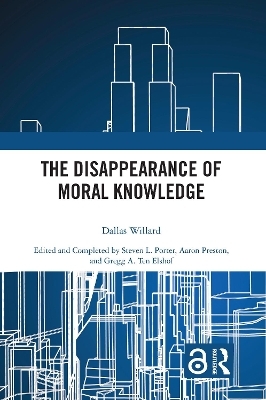
The Disappearance of Moral Knowledge
Routledge (Verlag)
978-1-138-58925-4 (ISBN)
Based on an unfinished manuscript by the late philosopher Dallas Willard, this book makes the case that the 20th century saw a massive shift in Western beliefs and attitudes concerning the possibility of moral knowledge, such that knowledge of the moral life and of its conduct is no longer routinely available from the social institutions long thought to be responsible for it. In this sense, moral knowledge—as a publicly available resource for living—has disappeared. Via a detailed survey of main developments in ethical theory from the late 19th through the late 20th centuries, Willard explains philosophy’s role in this shift. In pointing out the shortcomings of these developments, he shows that the shift was not the result of rational argument or discovery, but largely of arational social forces—in other words, there was no good reason for moral knowledge to have disappeared.
The Disappearance of Moral Knowledge is a unique contribution to the literature on the history of ethics and social morality. Its review of historical work on moral knowledge covers a wide range of thinkers including T.H Green, G.E Moore, Charles L. Stevenson, John Rawls, and Alasdair MacIntyre. But, most importantly, it concludes with a novel proposal for how we might reclaim moral knowledge that is inspired by the phenomenological approach of Knud Logstrup and Emmanuel Levinas. Edited and eventually completed by three of Willard’s former graduate students, this book marks the culmination of Willard’s project to find a secure basis in knowledge for the moral life.
The Open Access version of this book, available at www.taylorfrancis.com, has been made available under a Creative Commons Attribution-Non Commercial-No Derivatives (CC-BY-NC-ND) 4.0 license. Any third party material in this book is not included in the OA Creative Commons license, unless indicated otherwise in a credit line to the material. Please direct any permissions enquiries to the original rightsholder.
Funded by: Dallas Willard Ministries and the Willard Family Trust
Dallas Willard (1935-2013) was a Professor of Philosophy at the University of Southern California from 1965 to 2012. A specialist in the philosophy of Edmund Husserl, his publications include Logic and the Objectivity of Knowledge: a Study in Husserl’s Philosophy as well as numerous articles on Husserl as well as in ethics, epistemology, and the philosophy of religion. He also published the first English translations of Husserl’s Philosophy of Arithmetic, his Early Writings in the Philosophy of Logic and Mathematics, and a number of shorter pieces by Husserl and other early phenomenologists. Steven L. Porter is Professor of Theology and Philosophy at Biola University. He earned his Ph.D. in Philosophy from USC in 2003 under the direction of Dallas Willard. His previous publications include Restoring the Foundations of Epistemic Justification: A Direct Realist and Conceptualist Theory of Foundationalism and Neuroscience and the Soul: The Human Person in Philosophy, Science, and Theology. Aaron Preston is Associate Professor of Philosophy at Valparaiso University. He earned his Ph.D. in Philosophy from USC in 2002 under the direction of Dallas Willard. His previous publications include Analytic Philosophy: the History of an Illusion, and Analytic Philosophy: an Interpretive History. Gregg A. Ten Elshof is Professor of Philosophy at Biola University. He earned his Ph.D. in Philosophy from USC in 2000 under the direction of Dallas Willard. His previous publications include Introspection Vindicated, I Told Me So, and Confucius for Christians
Foreword, by Scott Soames
Editors’ Introduction
Preface
1. Moral Knowledge Disappears
2. A "Science of Ethics"?
3. G. E. Moore: From Science of Ethics to Nihilism
4. Emotivism: The Erasure of Moral Knowledge
5. A Rational Form of Noncognitivism? "Rational Necessity" Relocated
6. A Consensus of Rational People: Social Constructionism in Rawls
7. Practices, Traditions and Narratives: Social Constructionism in MacIntyre
8. Prospects for a Return of Moral Knowledge
| Erscheinungsdatum | 14.08.2018 |
|---|---|
| Verlagsort | London |
| Sprache | englisch |
| Maße | 152 x 229 mm |
| Gewicht | 725 g |
| Themenwelt | Geisteswissenschaften ► Philosophie ► Erkenntnistheorie / Wissenschaftstheorie |
| Geisteswissenschaften ► Philosophie ► Ethik | |
| Geisteswissenschaften ► Philosophie ► Philosophie der Neuzeit | |
| Religion / Theologie ► Christentum ► Kirchengeschichte | |
| ISBN-10 | 1-138-58925-X / 113858925X |
| ISBN-13 | 978-1-138-58925-4 / 9781138589254 |
| Zustand | Neuware |
| Haben Sie eine Frage zum Produkt? |
aus dem Bereich


